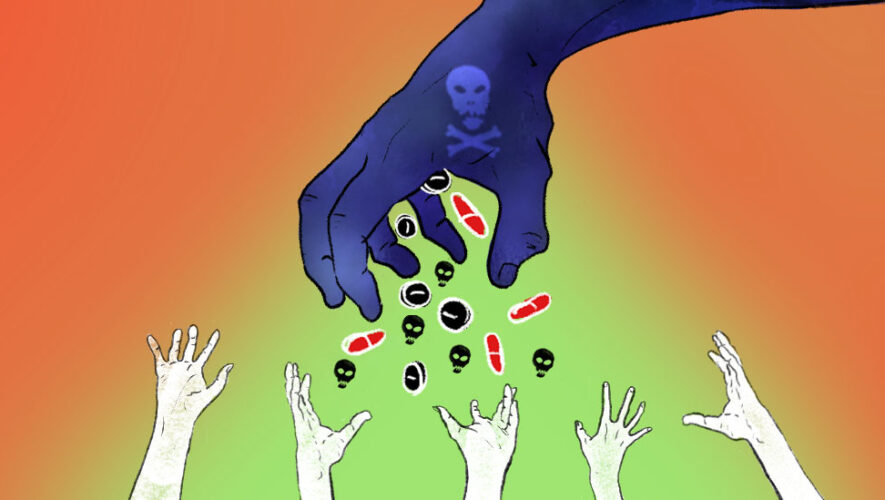Americans are increasingly turning to the internet for health advice. A 2022 study by CharityRx found that 65% of Americans use Google to get answers to health questions before they consult doctors. Around 20% try TikTok first, with the numbers higher for millennials and Gen-Z. As the demand for information grows, so does the supply of online “health influencers” ready to peddle products, supplements, and questionable treatments. According to the CharityRx study, 37% of Americans seek advice from online health influencers because they are easier to access than medical professionals. These individuals are rarely as reliable, however.
In 2022, the virtual healthcare platform PlushCare, which offers online doctor visits for primary care, mental health, and therapy, had researchers analyze 500 popular TikTok videos about mental health. 84% of the videos were deemed misleading, with 31% featuring inaccurate advice and 14% giving advice that could actually be dangerous. Only a small number of the videos – fewer than 50 – were made by qualified health professionals. TikTokers and health influencers discuss more than just mental health, of course, and it’s likely that much of the information we’re exposed to on social media is lacking in scientific rigor.
The Journal of Medical Internet Research published a study in 2021 concluding that most health misinformation on social media was related to vaccines, diets, drugs, diseases, and medical treatments. Twitter emerged as the site on which health misinformation was most common, though this may have changed in the last three years given the popularity of TikTok. Regardless of which sites you use, you’ve probably come across health misinformation. The nonprofit organization KFF, which specializes in health policy research, found in a study done last summer that most Americans have encountered false claims about vaccines and reproductive health and are “uncertain whether health misinformation items are definitely true or definitely false.”
Even seemingly trustworthy sources may promote questionable health advice. The recent case of Andrew Huberman is instructive. Huberman, a PhD. in neuroscience and an associate professor at Stanford School of Medicine, hosts a popular podcast on which he discusses a vast range of scientific topics. In many of the episodes, Huberman promotes products, supplements, and behavioral “protocols” he claims are scientifically supported to increase well-being. At the end of March this year, he was the subject of a long piece in New York Magazine that discussed some disturbing allegations about his personal life. The article also covered some of the dubious claims he has made and the suspect companies that sponsor his podcast.
Dr. Andrea Love, an immunologist and biomedical scientist, has also written about Huberman and the world of online health influencers. In an article for Slate, Love writes that Huberman “extrapolates non-human data to people, using in vitro studies, or in vivo studies on non-human animals, to make prescriptive recommendations for lifestyle changes.”
Love also criticizes his and other influencers’ frequent promotion of various supplements, such as ashwagandha and the nutritional powder AG1. “Steering your listeners into the wide and unregulated world of supplements is bad,” Love writes. “At best, most supplements do nothing. At worst, they can be harmful, potentially fatal…[supplements], thanks to a fun legal loophole, can be sold without the burden of safety and efficacy data that Food and Drug Administration–approved medications must generate.” Given that vitamins and supplements are a particularly popular topic on social media, it’s important to realize that few of them have any evidence of benefit.
Take the vitamins and supplements that are promoted by Instagram influencers: In 2022, researchers for Baylor University Medical Center Proceedings found that supplements for hair, skin, and nail health are popular on Instagram, but that many of these supplements “may be pharmacologically active and risk adverse effects … Ingredients such as vitamin A found in [Instagram] posts can pose teratogenic risk. Other potentially dangerous ingredients included saw palmetto and biotin.”
To make matters worse, some of these products are endorsed by celebrities or famous influencers, and according to the CharityRx study, 51% of Americans say that celebrity endorsements increase their intent to purchase health-related products. The Baylor University journal article concludes that there is an “increasing need for the medical community to engage with social media and offer accurate information for patients.” At the very least, there needs to be more pushback against the online influencers who are promoting potentially dangerous products and treatments.
Navigating the internet for accurate information is not easy. We are in an election year, a time during which false claims are likely to spread more quickly than usual. A report from NBC News claims that “the dangers from propaganda, falsehoods and conspiracy theories [are] more dire than ever.” The pandemic brought with it plenty of bizarre claims and falsehoods about the COVID-19 virus, masking, and lockdowns; further, technological and business developments in the wake of the pandemic make misinformation easier to spread.
“Artificial intelligence technology is ubiquitous…social media companies have slashed efforts to rein in misinformation on their platforms,” writes Brandy Zadrozny for NBC. Yet the solutions are not as simple as listening to “experts.” Even credentialed scientists are liable to hawk useless or possibly harmful products and promote misinformation, as we see with the Huberman case.
Given that younger generations are ever more reliant on smartphones and social media for information, online health advice and science misinformation aren’t going away. There’s a robust market for easy solutions and miracle cures, even if those solutions don’t work or end up hurting you. We must all be vigilant and skeptical of what we see on social media, and exercise caution whenever we see a new product or supplement being hailed as healthy or good for you. There’s a reason why myths like the Fountain of Youth never go out of style. Humans have always looked for panaceas and magic potions. Next time you’re in the mood for one, maybe talk to your doctor before pulling up Google.



